Conference
Report on the conference
Questioning Transitional Dynamics in Re-defining Cultural Identities in Southeastern Europe
15-16 January 2011, Ljubljana, Slovenia
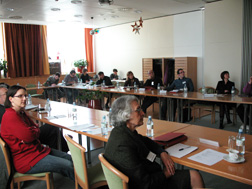 The conference was held on 15 and 16 January 2011 in the CityHotel in Ljubljana, Slovenia. The conference was organized by the Peace Institute as part of the project financed by the Austrian Science and Research Liaison Office Ljubljana on behalf of the Austrian Federal Ministry of Science and Research. Together with the Peace Institute, the partners of the project are the Institute for International Relations in Zagreb, Croatia, the University of Vienna, Austria, and the University of Arts in Belgrade, Serbia. The event gathered together 30 participants from partner and other research institutions in Southeastern Europe, and provided an excellent platform for an intense discussion of the case studies prepared by the project partners for this conference.
The conference was held on 15 and 16 January 2011 in the CityHotel in Ljubljana, Slovenia. The conference was organized by the Peace Institute as part of the project financed by the Austrian Science and Research Liaison Office Ljubljana on behalf of the Austrian Federal Ministry of Science and Research. Together with the Peace Institute, the partners of the project are the Institute for International Relations in Zagreb, Croatia, the University of Vienna, Austria, and the University of Arts in Belgrade, Serbia. The event gathered together 30 participants from partner and other research institutions in Southeastern Europe, and provided an excellent platform for an intense discussion of the case studies prepared by the project partners for this conference.
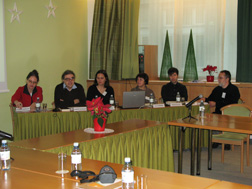 The conference was opened with a welcome speech by Lev Kreft, the director of the Peace Institute, who highlighted the changing nature of cultural identities in the Southeast European region. Following his speech the conference work began with the first panel that was devoted to “Identity construction in an economic and historical perspective”, chaired by Aldo Milohnić from the Peace Institute. The first speakers were Andrea Komlosy and Hannes Hofbauer from the University of Vienna who presented their paper entitled “Identity construction in the Balkan region – Austrian interests and involvements in a historical perspective”. Their presentation consisted of two parts: in the first part Hannes Hofbauer gave a historical outline of Austrian involvement in the Balkan region, while in the second part Andrea Komlosy gave further insights that centred on the current Austrian perception of the identities of inhabitants of the Balkans. The second presenter in the panel was Jaka Primorac from the Institute for International Relations with a paper entitled “Culture of hits vs. culture of niches – cultural industries and processes of cultural identification in Croatia” where she highlighted the emergence of two cultures that are influencing the development of new identitarian models that are becoming more dominant in Croatia. By giving an analysis of the selected data on cultural consumption and cultural production she outlined how, on the one hand, there is a strong influence from global cultural industry in Croatia (that is also present in the region) but, on the other hand, there are opportunities that are offered by the culture of niches. The following presenter was Maja Breznik from the Peace Institute with a paper entitled “Cultural identities from the bottom up” where she approached the re-questioning of cultural identities from the perspective of labour relations taking ‘artists’ and ‘authors’, that is, the ‘creative class’ as the subject of her examination. The main focus of the presentation dealt with the identity of cultural workers due to their present precarious labour relations and the ever-present reduction of their labour rights. In the next presentation entitled “Cultural policy of art collectives”, guest speaker Sezgin Boynik from the University of Jyväskylä, Finland, brought collective and collaborational art practices to the attention of the panel. He analysed how the ideological implications of collective art practices in the post-Yugoslav states relate to the conception of self-managed socialism and the transition from socialism to capitalism. In his analysis he gave examples of several collective art practices, mainly from Croatia. After the presentations a short discussion followed where the audience asked for clarification of selected historical data relating to certain issues of Austrian influence in the region, and of definitions of the Southeast European/Balkan region. The need for more refined explanation of the influence of global cultural industry on the culture in the region of Southeastern Europe was also stressed, which was related to the second presentation in the panel.
The conference was opened with a welcome speech by Lev Kreft, the director of the Peace Institute, who highlighted the changing nature of cultural identities in the Southeast European region. Following his speech the conference work began with the first panel that was devoted to “Identity construction in an economic and historical perspective”, chaired by Aldo Milohnić from the Peace Institute. The first speakers were Andrea Komlosy and Hannes Hofbauer from the University of Vienna who presented their paper entitled “Identity construction in the Balkan region – Austrian interests and involvements in a historical perspective”. Their presentation consisted of two parts: in the first part Hannes Hofbauer gave a historical outline of Austrian involvement in the Balkan region, while in the second part Andrea Komlosy gave further insights that centred on the current Austrian perception of the identities of inhabitants of the Balkans. The second presenter in the panel was Jaka Primorac from the Institute for International Relations with a paper entitled “Culture of hits vs. culture of niches – cultural industries and processes of cultural identification in Croatia” where she highlighted the emergence of two cultures that are influencing the development of new identitarian models that are becoming more dominant in Croatia. By giving an analysis of the selected data on cultural consumption and cultural production she outlined how, on the one hand, there is a strong influence from global cultural industry in Croatia (that is also present in the region) but, on the other hand, there are opportunities that are offered by the culture of niches. The following presenter was Maja Breznik from the Peace Institute with a paper entitled “Cultural identities from the bottom up” where she approached the re-questioning of cultural identities from the perspective of labour relations taking ‘artists’ and ‘authors’, that is, the ‘creative class’ as the subject of her examination. The main focus of the presentation dealt with the identity of cultural workers due to their present precarious labour relations and the ever-present reduction of their labour rights. In the next presentation entitled “Cultural policy of art collectives”, guest speaker Sezgin Boynik from the University of Jyväskylä, Finland, brought collective and collaborational art practices to the attention of the panel. He analysed how the ideological implications of collective art practices in the post-Yugoslav states relate to the conception of self-managed socialism and the transition from socialism to capitalism. In his analysis he gave examples of several collective art practices, mainly from Croatia. After the presentations a short discussion followed where the audience asked for clarification of selected historical data relating to certain issues of Austrian influence in the region, and of definitions of the Southeast European/Balkan region. The need for more refined explanation of the influence of global cultural industry on the culture in the region of Southeastern Europe was also stressed, which was related to the second presentation in the panel.
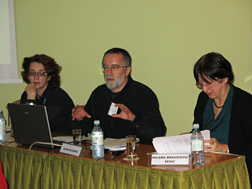 The second panel of the conference was devoted to “Visual and performative re-construction of identities” and was chaired by Andrea Komlosy. The first presentation was delivered by Milena Dragićević Šešić from the University of Arts in Belgrade, on the topic of the “Monument policies as cultural policies from the perspective of identity re-construction and representation”. Dragićević-Šešić dealt with the politics of memory, with its structures of remembering, repressing and forgetting as forms of ‘predatory nationalism’ as Appadurai would put it, through the public cultural and educational system. By analysing a number of performances, installations and exhibitions she outlined a hypothesis that the public arts in Belgrade throughout the 1990s had an ambiguous and ambivalent role that depended on the organizers’ and/or producers’ intentions. In the presentation she focused on those aspects of public arts that questioned the official policy of remembrance and representation, and turned instead to a new official urban policy suggesting a concept for public space as space for entertainment and consumption. The next presenter was Aldo Milohnić from the Peace Institute, Ljubljana, with a paper on “Performing identities: national theatres and re-construction of identities in Slovenia and SFR Yugoslavia” where he examined the role of national theatres in the construction of identities in Slovenia and in other countries of the former Yugoslavia. The predominantly historical approach was combined with an analysis of the cultural, social and political position of national theatres in recent and not so recent ‘turbulent times’. Together with a critical reading of theatre identity politics in newly established states, Milohnić also outlined some other important aspects of theatre policies related, for example, to the funding of national theatres, relations between national theatres and ‘independent’ theatre. In the final part of the session, guest speaker and discussant Jasmina Husanović from the University of Tuzla gave a presentation entitled “Culture of trauma and identity politics: critical frames and emancipatory lenses of cultural and knowledge production” where she reflected on the ways forward in recent knowledge production with a focus on the gestures of repoliticization within the cultural politics of memory in the (post)Yugoslav space. By commenting on the previous papers, Husanović highlighted the importance of artistic and scientific interventions that question and redefine contemporary cultural politics in the countries of former Yugoslavia. The discussion that followed concentrated on these issues, and thus prepared the terrain for the next panel that also focused on monument policy.
The second panel of the conference was devoted to “Visual and performative re-construction of identities” and was chaired by Andrea Komlosy. The first presentation was delivered by Milena Dragićević Šešić from the University of Arts in Belgrade, on the topic of the “Monument policies as cultural policies from the perspective of identity re-construction and representation”. Dragićević-Šešić dealt with the politics of memory, with its structures of remembering, repressing and forgetting as forms of ‘predatory nationalism’ as Appadurai would put it, through the public cultural and educational system. By analysing a number of performances, installations and exhibitions she outlined a hypothesis that the public arts in Belgrade throughout the 1990s had an ambiguous and ambivalent role that depended on the organizers’ and/or producers’ intentions. In the presentation she focused on those aspects of public arts that questioned the official policy of remembrance and representation, and turned instead to a new official urban policy suggesting a concept for public space as space for entertainment and consumption. The next presenter was Aldo Milohnić from the Peace Institute, Ljubljana, with a paper on “Performing identities: national theatres and re-construction of identities in Slovenia and SFR Yugoslavia” where he examined the role of national theatres in the construction of identities in Slovenia and in other countries of the former Yugoslavia. The predominantly historical approach was combined with an analysis of the cultural, social and political position of national theatres in recent and not so recent ‘turbulent times’. Together with a critical reading of theatre identity politics in newly established states, Milohnić also outlined some other important aspects of theatre policies related, for example, to the funding of national theatres, relations between national theatres and ‘independent’ theatre. In the final part of the session, guest speaker and discussant Jasmina Husanović from the University of Tuzla gave a presentation entitled “Culture of trauma and identity politics: critical frames and emancipatory lenses of cultural and knowledge production” where she reflected on the ways forward in recent knowledge production with a focus on the gestures of repoliticization within the cultural politics of memory in the (post)Yugoslav space. By commenting on the previous papers, Husanović highlighted the importance of artistic and scientific interventions that question and redefine contemporary cultural politics in the countries of former Yugoslavia. The discussion that followed concentrated on these issues, and thus prepared the terrain for the next panel that also focused on monument policy.
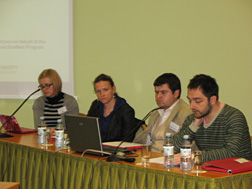 The third panel consisted of a presentation of work by students from the University of Arts in Belgrade and was chaired by Milena Dragićević Šešić. The panel was opened by Jasmina Gavrankapetanović-Redžić who gave an analysis of the centre for the Srebrenica-Potočari memorial and cemetery for the victims of the 1995 genocide in Bosnia and Herzegovina. The following presentation by Marijana Lubina was devoted to an analysis of the work by the Croatian contemporary artist Siniša Labrović “Bandaging wounds of a partisan fighter” as a response to the policy of forgetting. Next, Vladimir Miladinović spoke on the politicization of memory through the monument culture using some examples from Serbia. An interesting illustration of some of the aforementioned issues was given in the following presentation by Dušan Nešković, which analysed the monument dedicated to Karadjordje and Misar’s heroes. As an addition to this panel Jasmina Gavrankapetanović-Redžić made a short presentation of a paper from her colleague Iva Simčić that was devoted to the work by Braco Dimitrijević entitled “Under this stone there is a monument to the victims of war and the cold war”.
The third panel consisted of a presentation of work by students from the University of Arts in Belgrade and was chaired by Milena Dragićević Šešić. The panel was opened by Jasmina Gavrankapetanović-Redžić who gave an analysis of the centre for the Srebrenica-Potočari memorial and cemetery for the victims of the 1995 genocide in Bosnia and Herzegovina. The following presentation by Marijana Lubina was devoted to an analysis of the work by the Croatian contemporary artist Siniša Labrović “Bandaging wounds of a partisan fighter” as a response to the policy of forgetting. Next, Vladimir Miladinović spoke on the politicization of memory through the monument culture using some examples from Serbia. An interesting illustration of some of the aforementioned issues was given in the following presentation by Dušan Nešković, which analysed the monument dedicated to Karadjordje and Misar’s heroes. As an addition to this panel Jasmina Gavrankapetanović-Redžić made a short presentation of a paper from her colleague Iva Simčić that was devoted to the work by Braco Dimitrijević entitled “Under this stone there is a monument to the victims of war and the cold war”.
The rest of the Saturday afternoon was devoted to a working meeting of the project partners who discussed issues related to the continuation of the project mainly connected to the publication of the conference proceedings, dissemination of the project results and other more technical issues.
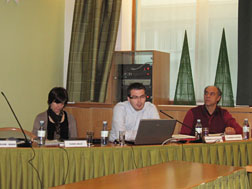 The second day of the conference continued with the fourth panel on “Mass media, social media and cultural identities”, chaired by Nada Švob-Đokić from the Institute for International Relations. The first presenter was Brankica Petković from the Peace Institute and she presented her work entitled “Instrumentalisation of language and media policies for re-positioning of Ex-Yugoslav cultural identities in Slovenia”. Petković examined how the language situation of other nations of the former Yugoslavia in Slovenia changed with the independence of Slovenia, how it affected specific post-Yugoslav re-construction and re-positioning of cultural identities, and how it was/is supported by the media system in Slovenia. Next, Paško Bilić from the Institute for International Relations gave a presentation on “How social media enforce glocalization – the processes of identity change in selected Central and Southeast European countries”. The main focus of this paper was on the processes of cultural change and how they are enforced through the use of social media and seen from the global perspective. By using theoretical arguments and statistical data Bilić focused on the question of redefining cultural identities through social media, with the examples of Facebook and Wikipedia, while taking into account the regional context. This line of discussion was continued by the guest speaker Vladimir Davčev from the University of Saints Cyril and Methodius in Skopje, Macedonia, in his presentation “How modern technology shape-shifts our identity”. Davčev highlighted the infinite possibilities that the anonymity of cyberspace brings for the emergence of identities that can be constructed in online communication. What needs to be remembered is that these online characters are expressions of real-world experiences, ideas and so forth. The interconnectedness of the offline and online world is thus stressed in the conclusion of the presentation. In the discussion that followed the participants of the conference asked presenters on the panel for a more regional based approach to the issues relating to the influence of the new technologies on identification processes in the final version of their papers.
The second day of the conference continued with the fourth panel on “Mass media, social media and cultural identities”, chaired by Nada Švob-Đokić from the Institute for International Relations. The first presenter was Brankica Petković from the Peace Institute and she presented her work entitled “Instrumentalisation of language and media policies for re-positioning of Ex-Yugoslav cultural identities in Slovenia”. Petković examined how the language situation of other nations of the former Yugoslavia in Slovenia changed with the independence of Slovenia, how it affected specific post-Yugoslav re-construction and re-positioning of cultural identities, and how it was/is supported by the media system in Slovenia. Next, Paško Bilić from the Institute for International Relations gave a presentation on “How social media enforce glocalization – the processes of identity change in selected Central and Southeast European countries”. The main focus of this paper was on the processes of cultural change and how they are enforced through the use of social media and seen from the global perspective. By using theoretical arguments and statistical data Bilić focused on the question of redefining cultural identities through social media, with the examples of Facebook and Wikipedia, while taking into account the regional context. This line of discussion was continued by the guest speaker Vladimir Davčev from the University of Saints Cyril and Methodius in Skopje, Macedonia, in his presentation “How modern technology shape-shifts our identity”. Davčev highlighted the infinite possibilities that the anonymity of cyberspace brings for the emergence of identities that can be constructed in online communication. What needs to be remembered is that these online characters are expressions of real-world experiences, ideas and so forth. The interconnectedness of the offline and online world is thus stressed in the conclusion of the presentation. In the discussion that followed the participants of the conference asked presenters on the panel for a more regional based approach to the issues relating to the influence of the new technologies on identification processes in the final version of their papers.
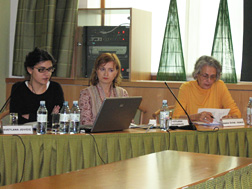 The fifth panel “Post-transitional perspectives: cultural identities and cultural education” was chaired by Milena Dragićević Šešić. The first speaker was Svetlana Jovičić from the University of Arts in Belgrade and she spoke on the “Re-shaping of identities through youth/children cultural education policies” where she focused on the cultural and educational context of identification processes. In her presentation she also reviewed selected cultural practices relating to children that dealt mainly with the Serbian context, but with references to some other countries as well. The presentation that followed by Nada Švob-Đokić entitled “Cultural identities in Southeastern Europe: a post-transitional perspective” concentrated on the structural elements of cultural space (‘institutional’ culture, ‘independent’ culture and ‘market oriented’ culture) that illustrate ongoing cultural changes. Švob-Đokić showed that such changes occur through the influences that spread from European cultures and global cultural trends that are ever more present due to the influence of new technologies, cultural industries and the mediatization of culture. In the next presentation “Repetition of difference – search for unstable identity” guest speaker Svetlana Racanović, an independent curator from Montenegro, noted how the shift to the post-transitional situation is a process marked by many ambiguities that result in an unstable identity. She opened a discussion where many issues related to the post-transitional situation were raised, from the development of ‘independent culture’ in the region to the influence of cultural products from Turkish cultural industries (mainly soap operas) in countries of Southeastern Europe.
The fifth panel “Post-transitional perspectives: cultural identities and cultural education” was chaired by Milena Dragićević Šešić. The first speaker was Svetlana Jovičić from the University of Arts in Belgrade and she spoke on the “Re-shaping of identities through youth/children cultural education policies” where she focused on the cultural and educational context of identification processes. In her presentation she also reviewed selected cultural practices relating to children that dealt mainly with the Serbian context, but with references to some other countries as well. The presentation that followed by Nada Švob-Đokić entitled “Cultural identities in Southeastern Europe: a post-transitional perspective” concentrated on the structural elements of cultural space (‘institutional’ culture, ‘independent’ culture and ‘market oriented’ culture) that illustrate ongoing cultural changes. Švob-Đokić showed that such changes occur through the influences that spread from European cultures and global cultural trends that are ever more present due to the influence of new technologies, cultural industries and the mediatization of culture. In the next presentation “Repetition of difference – search for unstable identity” guest speaker Svetlana Racanović, an independent curator from Montenegro, noted how the shift to the post-transitional situation is a process marked by many ambiguities that result in an unstable identity. She opened a discussion where many issues related to the post-transitional situation were raised, from the development of ‘independent culture’ in the region to the influence of cultural products from Turkish cultural industries (mainly soap operas) in countries of Southeastern Europe.
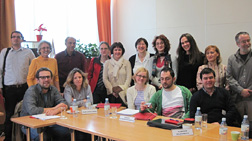 With this last panel the conference came to its close, and it can be said that it showed how cultural identities are a dynamic social phenomena in Southeastern Europe. The papers presented outlined a plethora of diverse issues that need to be discussed in relation to the changing nature of cultural identification processes in this region. On behalf of the organizers of the conference, Aldo Milohnić thanked the participants for their efforts and for the lively discussions that resulted from the presentations of the case studies. He also announced the deadline for submission of final papers and the publication of the conference reader in April 2011.
With this last panel the conference came to its close, and it can be said that it showed how cultural identities are a dynamic social phenomena in Southeastern Europe. The papers presented outlined a plethora of diverse issues that need to be discussed in relation to the changing nature of cultural identification processes in this region. On behalf of the organizers of the conference, Aldo Milohnić thanked the participants for their efforts and for the lively discussions that resulted from the presentations of the case studies. He also announced the deadline for submission of final papers and the publication of the conference reader in April 2011.
Reported by: Jaka Primorac
Programme of the conference ( )
)
